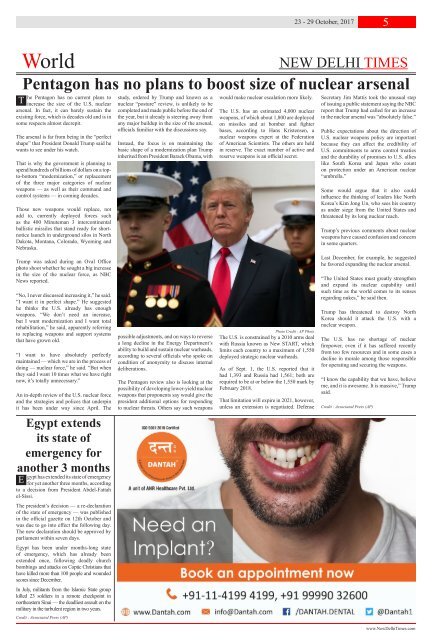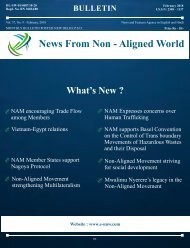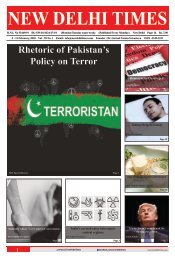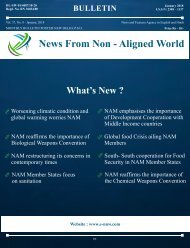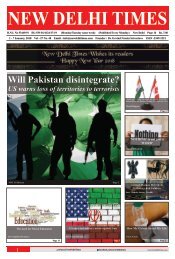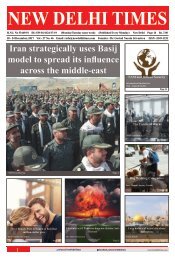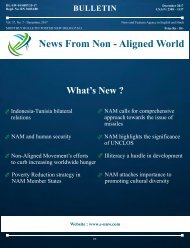23 - 29 October 2017
Create successful ePaper yourself
Turn your PDF publications into a flip-book with our unique Google optimized e-Paper software.
<strong>23</strong> - <strong>29</strong> <strong>October</strong>, <strong>2017</strong> 5<br />
T<br />
E<br />
World<br />
NEW DELHI TIMES<br />
Pentagon has no plans to boost size of nuclear arsenal<br />
he Pentagon has no current plans to<br />
increase the size of the U.S. nuclear<br />
arsenal. In fact, it can barely sustain the<br />
existing force, which is decades old and is in<br />
some respects almost decrepit.<br />
The arsenal is far from being in the “perfect<br />
shape” that President Donald Trump said he<br />
wants to see under his watch.<br />
That is why the government is planning to<br />
spend hundreds of billions of dollars on a topto-bottom<br />
“modernization,” or replacement<br />
of the three major categories of nuclear<br />
weapons — as well as their command and<br />
control systems — in coming decades.<br />
Those new weapons would replace, not<br />
add to, currently deployed forces such<br />
as the 400 Minuteman 3 intercontinental<br />
ballistic missiles that stand ready for shortnotice<br />
launch in underground silos in North<br />
Dakota, Montana, Colorado, Wyoming and<br />
Nebraska.<br />
Trump was asked during an Oval Office<br />
photo shoot whether he sought a big increase<br />
in the size of the nuclear force, as NBC<br />
News reported.<br />
“No, I never discussed increasing it,” he said.<br />
“I want it in perfect shape.” He suggested<br />
he thinks the U.S. already has enough<br />
weapons. “We don’t need an increase,<br />
but I want modernization and I want total<br />
rehabilitation,” he said, apparently referring<br />
to replacing weapons and support systems<br />
that have grown old.<br />
“I want to have absolutely perfectly<br />
maintained — which we are in the process of<br />
doing — nuclear force,” he said. “But when<br />
they said I want 10 times what we have right<br />
now, it’s totally unnecessary.”<br />
An in-depth review of the U.S. nuclear force<br />
and the strategies and polices that underpin<br />
it has been under way since April. The<br />
Egypt extends<br />
its state of<br />
emergency for<br />
another 3 months<br />
gypt has extended its state of emergency<br />
for yet another three months, according<br />
to a decision from President Abdel-Fattah<br />
el-Sissi.<br />
The president’s decision — a re-declaration<br />
of the state of emergency — was published<br />
in the official gazette on 12th <strong>October</strong> and<br />
was due to go into effect the following day.<br />
The new declaration should be approved by<br />
parliament within seven days.<br />
Egypt has been under months-long state<br />
of emergency, which has already been<br />
extended once, following deadly church<br />
bombings and attacks on Coptic Christians that<br />
have killed more than 100 people and wounded<br />
scores since December.<br />
In July, militants from the Islamic State group<br />
killed <strong>23</strong> soldiers in a remote checkpoint in<br />
northeastern Sinai — the deadliest assault on the<br />
military in the turbulent region in two years.<br />
Credit : Associated Press (AP)<br />
study, ordered by Trump and known as a<br />
nuclear “posture” review, is unlikely to be<br />
completed and made public before the end of<br />
the year, but it already is steering away from<br />
any major buildup in the size of the arsenal,<br />
officials familiar with the discussions say.<br />
Instead, the focus is on maintaining the<br />
basic shape of a modernization plan Trump<br />
inherited from President Barack Obama, with<br />
possible adjustments, and on ways to reverse<br />
a long decline in the Energy Department’s<br />
ability to build and sustain nuclear warheads,<br />
according to several officials who spoke on<br />
condition of anonymity to discuss internal<br />
deliberations.<br />
The Pentagon review also is looking at the<br />
possibility of developing lower-yield nuclear<br />
weapons that proponents say would give the<br />
president additional options for responding<br />
to nuclear threats. Others say such weapons<br />
would make nuclear escalation more likely.<br />
The U.S. has an estimated 4,000 nuclear<br />
weapons, of which about 1,800 are deployed<br />
on missiles and at bomber and fighter<br />
bases, according to Hans Kristensen, a<br />
nuclear weapons expert at the Federation<br />
of American Scientists. The others are held<br />
in reserve. The exact number of active and<br />
reserve weapons is an official secret.<br />
Photo Credit : AP Photo<br />
The U.S. is constrained by a 2010 arms deal<br />
with Russia known as New START, which<br />
limits each country to a maximum of 1,550<br />
deployed strategic nuclear warheads.<br />
As of Sept. 1, the U.S. reported that it<br />
had 1,393 and Russia had 1,561; both are<br />
required to be at or below the 1,550 mark by<br />
February 2018.<br />
That limitation will expire in 2021, however,<br />
unless an extension is negotiated. Defense<br />
Secretary Jim Mattis took the unusual step<br />
of issuing a public statement saying the NBC<br />
report that Trump had called for an increase<br />
in the nuclear arsenal was “absolutely false.”<br />
Public expectations about the direction of<br />
U.S. nuclear weapons policy are important<br />
because they can affect the credibility of<br />
U.S. commitments to arms control treaties<br />
and the durability of promises to U.S. allies<br />
like South Korea and Japan who count<br />
on protection under an American nuclear<br />
“umbrella.”<br />
Some would argue that it also could<br />
influence the thinking of leaders like North<br />
Korea’s Kim Jong Un, who sees his country<br />
as under siege from the United States and<br />
threatened by its long nuclear reach.<br />
Trump’s previous comments about nuclear<br />
weapons have caused confusion and concern<br />
in some quarters.<br />
Last December, for example, he suggested<br />
he favored expanding the nuclear arsenal.<br />
“The United States must greatly strengthen<br />
and expand its nuclear capability until<br />
such time as the world comes to its senses<br />
regarding nukes,” he said then.<br />
Trump has threatened to destroy North<br />
Korea should it attack the U.S. with a<br />
nuclear weapon.<br />
The U.S. has no shortage of nuclear<br />
firepower, even if it has suffered recently<br />
from too few resources and in some cases a<br />
decline in morale among those responsible<br />
for operating and securing the weapons.<br />
“I know the capability that we have, believe<br />
me, and it is awesome. It is massive,” Trump<br />
said.<br />
Credit : Associated Press (AP)<br />
www.NewDelhiTimes.com


